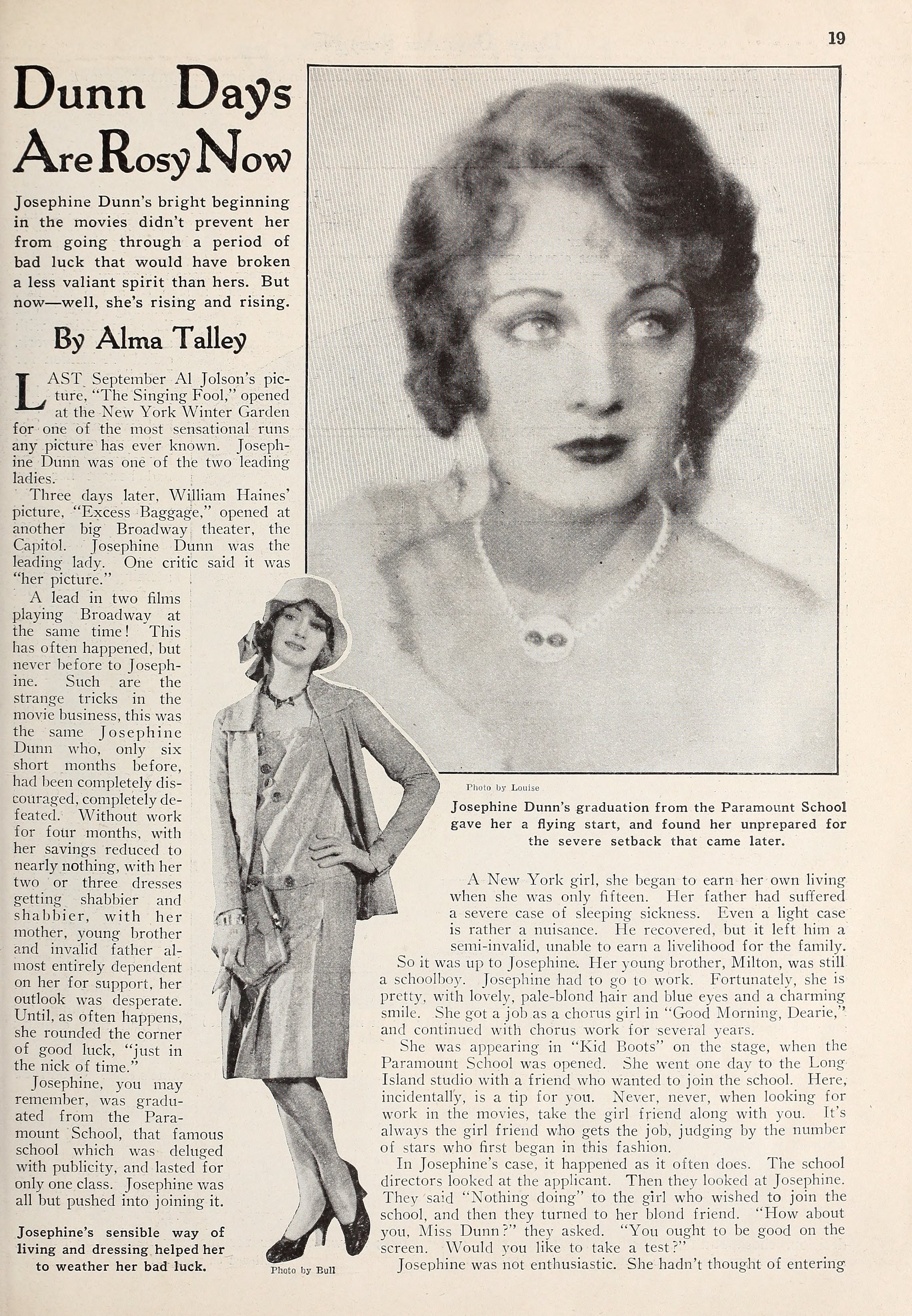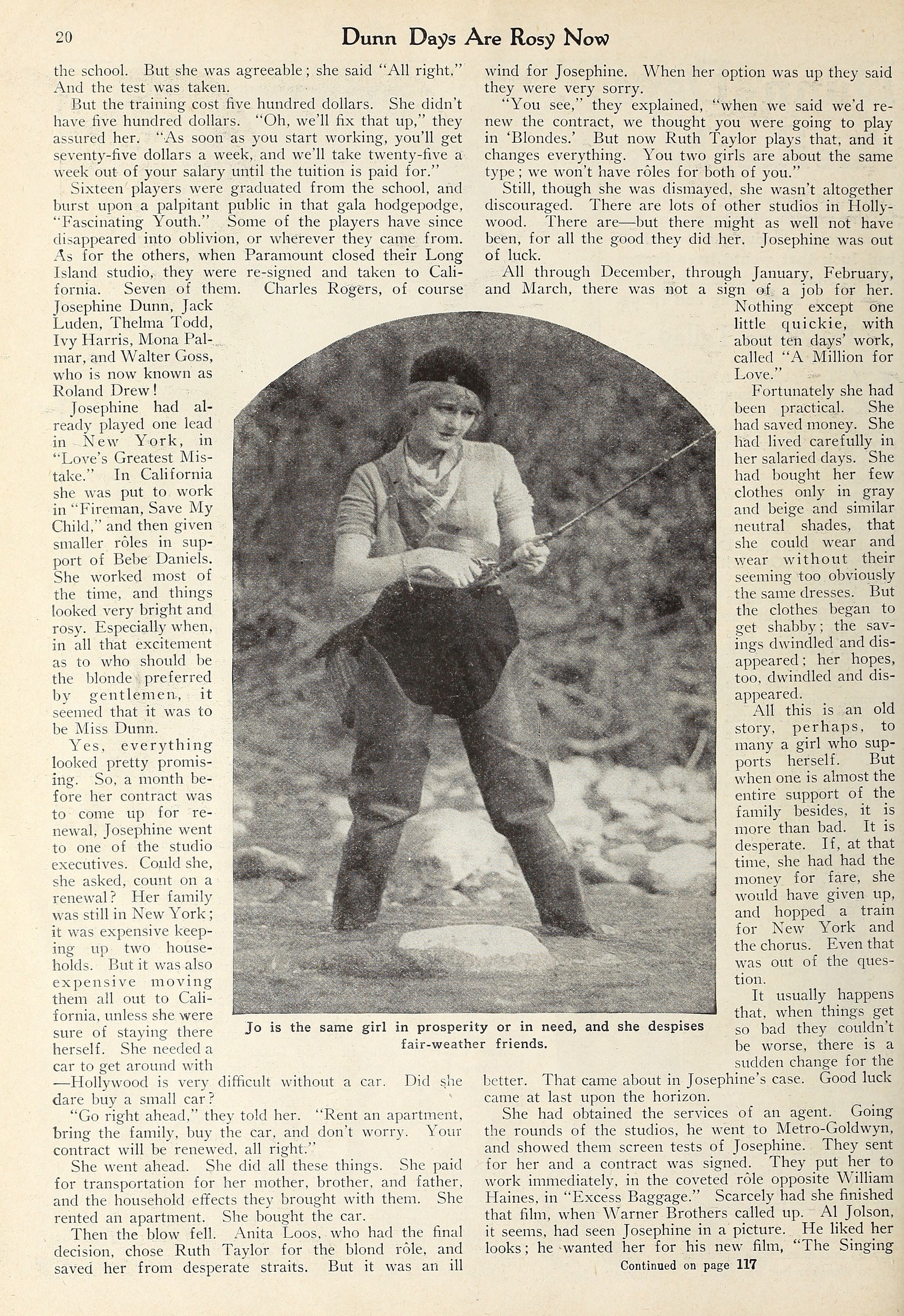Josephine Dunn — Dunn Days Are Rosy Now (1929) 🇺🇸

Last September Al Jolson’s picture, “The Singing Fool,” opened at the New York Winter Garden for one of the most sensational runs any picture has ever known. Josephine Dunn was one of the two leading ladies.
by Alma Talley
Three days later, William Haines’ picture, Excess Baggage, opened at another big Broadway theater, the Capitol. Josephine Dunn was the leading lady. One critic said it was “her picture.”
A lead in two films playing Broadway at the same time! This has often happened, but never before to Josephine. Such are the strange tricks in the movie business, this was the same Josephine Dunn who, only six short months before, had been completely discouraged, completely defeated. Without work for four months, with her savings reduced to nearly nothing, with her two or three dresses getting shabbier and shabbier, with her mother, young brother and invalid father almost entirely dependent on her for support, her outlook was desperate. Until, as often happens, she rounded the corner of good luck, “just in the nick of time.”
Josephine, you may remember, was graduated from the Paramount School, that famous school which was deluged with publicity, and lasted for only one class. Josephine was all but pushed into joining it.
A New York girl, she began to earn her own living when she was only fifteen. Her father had suffered a severe case of sleeping sickness. Even a light case is rather a nuisance. He recovered, but it left him a semi-invalid, unable to earn a livelihood for the family. So it was up to Josephine. Her young brother, Milton, was still a schoolboy. Josephine had to go to work. Fortunately, she is pretty, with lovely, pale-blond hair and blue eyes and a charming smile. She got a job as a chorus girl in Good Morning, Dearie, and continued with chorus work for several years.
She was appearing in Kid Boots on the stage, when the Paramount School was opened. She went one day to the Long Island studio with a friend who wanted to join the school. Here, incidentally, is a tip for you. Never, never, when looking for work in the movies, take the girl friend along with you. It’s always the girl friend who gets the job, judging by the number of stars who first began in this fashion.
In Josephine’s case, it happened as it often does. The school directors looked at the applicant. Then they looked at Josephine. They said “Nothing doing” to the girl who wished to join the school, and then they turned to her blond friend. “How about you, Miss Dunn?” they asked. “You ought to be good on the screen. Would you like to take a test?”
Josephine was not enthusiastic. She hadn’t thought of entering the school. But she was agreeable; she said “All right,” And the test was taken.
But the training cost five hundred dollars. She didn’t have five hundred dollars. “Oh, we’ll fix that up,” they assured her. “As soon as you start working, you’ll get seventy-five dollars a week, and we’ll take twenty-five a week out of your salary until the tuition is paid for.”
Sixteen’ players were graduated from the school, and burst upon a palpitant public in that gala hodgepodge, Fascinating Youth. Some of the players have since disappeared into oblivion, or wherever they came from. As for the others, when Paramount closed their Long Island studio, they were re-signed and taken to California. Seven of them. Charles Rogers, of course Josephine Dunn, Jack Luden, Thelma Todd, Ivy Harris, Mona Palmar, and Walter Goss, who is now known as Roland Drew!
Josephine had already played one lead in New York, in Love’s Greatest Mistake. In California she was put to work in Fireman, Save My Child, and then given smaller roles in support of Bebe Daniels. She worked most of the time, and things looked very bright and rosy. Especially when, in all that excitement as to who should be the blonde preferred by gentlemen, it seemed that it was to be Miss Dunn.
Yes, everything looked pretty promising. So, a month before her contract was to come up for renewal, Josephine went to one of the studio executives. Could she, she asked, count on a renewal? Her family was still in New York; it was expensive keeping up two households. But it was also expensive moving them all out to California, unless she were sure of staying there herself. She needed a car to get around with — Hollywood is very difficult without a car. Did she dare buy a small car?
“Go right ahead,” they told her. “Rent an apartment, bring the family, buy the car, and don’t worry. Your contract will be renewed, all right.”
She went ahead. She did all these things. She paid for transportation for her mother, brother, and father, and the household effects they brought with them. She rented an apartment. She bought the car.
Then the blow fell. Anita Loos, who had the final decision, chose Ruth Taylor for the blond role, and saved her from desperate straits. But it was an ill wind for Josephine. When her option was up they said they were very sorry.
“You see,” they explained, “when we said we’d renew the contract, we thought you were going to play in Blondes. But now Ruth Taylor plays that, and it changes everything. You two girls are about the same type; we won’t have roles for both of you.”
Still, though she was dismayed, she wasn’t altogether discouraged. There are lots of other studios in Hollywood. There are — but there might as well not have been, for all the good they did her. Josephine was out of luck.
All through December, through January, February, and March, there was not a sign of a job for her.
Nothing except one little quickie, with about ten days’ work, called A Million for Love.
Fortunately she had been practical. She had saved money. She had lived carefully in her salaried days. She had bought her few clothes only in gray and beige and similar neutral shades, that she could wear and wear without their seeming too obviously the same dresses. But the clothes began to get shabby; the savings dwindled and disappeared; her hopes, too, dwindled and disappeared.
All this is an old story, perhaps, to many a girl who supports herself. But when one is almost the entire support of the family besides, it is more than bad. It is desperate. If, at that time, she had had the money for fare, she would have given up, and hopped a train for New York and the chorus. Even that was out of the question.
It usually happens that, when things get so bad they couldn’t be worse, there is a sudden change for the better. That came about in Josephine’s case. Good luck came at last upon the horizon.
She had obtained the services of an agent. Going the rounds of the studios, he went to Metro-Goldwyn, and showed them screen tests of Josephine. They sent for her and a contract was signed. They put her to work immediately, in the coveted role opposite William Haines, in Excess Baggage. Scarcely had she finished that film, when Warner Brothers called up. Al Jolson, it seems, had seen Josephine in a picture. He liked her looks; he wanted her for his new film, The Singing Fool. “And so,” said a Warner man to a Metro-Goldwyn man, “will you lend us Josephine Dunn?”
Josephine was thrilled and excited. Who wouldn’t be? A contract with one company scarcely a month old, and another company had asked to borrow her! Of course that adds to one’s prestige in the home studio; it makes them feel they have a real “find” in their new contract-player.
Josephine’s career is well under way at last. Since the signing of her new contract she has worked constantly, in one film after another — A Man’s Man, with William Haines, Sioux Blood, with Tim McCoy, Our Modern Maidens, and “White Silence,” for which she was borrowed by Fox.
Through good luck and bad, in prosperity or in need, Josephine is always the same girl. To her, a friend is a friend. In fact, that’s her most outstanding trait, loyalty. The only thing I have ever heard her speak bitterly about is the fairweather friendships she has encountered during her ups and downs.
“It makes me furious,” she told me, right after signing her new contract. “All sorts of people are dashing up to me now, just too sweet for anything, who would hardly speak to me a month ago, when I couldn’t get work.”
Her feeling on this subject is very strong, as was proved by an incident at a party in Hollywood. A girl came up to me and said, “Say, was it my imagination, or was Josephine Dunn high-hatting me when I spoke to her just now?”
So I asked Josephine if she had been ritzing Miss Blank.
“I most certainly did ritz her!” Jo declared. “And I’ll keep right on doing it. I’ve known her for years, back in my chorus days. One night at a party the hostess introduced us. I said, ‘Oh, hello,’ very cordially, and she acknowledged the introduction formally, ‘How do you do, Miss Dunn?’ just as if she had never seen me before. I was terribly hurt.
“Now she’s just too sweet and friendly for anything. Well, I’m not! If people can’t like me when I’m having a hard time getting along, they can keep right on not liking me when my luck changes. I’m just the same girl, either way.”
And that’s the nicest thing about Josephine — she is.

Josephine’s sensible way of living and dressing helped her to weather her bad luck.
Photo by: Clarence Sinclair Bull (1896–1979)
Josephine Dunn’s graduation from the Paramount School gave her a flying start, and found her unprepared for the severe setback that came later.
Photo by: Ruth Harriet Louise (1903–1940)

Jo is the same girl in prosperity or in need, and she despises fair-weather friends.

Collection: Picture Play Magazine, April 1929
